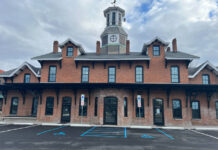
The proposed 2023 budget for the Luzerne County Correctional Facility in Wilkes-Barre, shown here, will be discussed during Tuesday’s council work session.
File photo
Rising food costs are hurting Luzerne County’s correctional services budget, records show.
Next year’s requested allotment for “kitchen and groceries” is $1.3 million, which would be an increase of $335,000, according to a review of the correctional division’s proposed 2023 budget up for county council discussion Tuesday.
That would cover an average 1,800 meals provided daily to inmates at the prison on Water Street and minimal offenders building on nearby Reichard Street, both in Wilkes-Barre, said county Acting Correctional Services Division Head John Robshaw.
Mirroring the general public’s experience, food prices have sharply increased in the county prison system, he said.
Approximately $952,000 of this year’s $965,000 food allocation for the two facilities had been spent as of Sept. 30, county records show. As a result, the administration had to transfer $422,174 in funds from another budget category in October to cover the expense through the end of the year.
Robshaw said Monday he is exploring the possibility of bringing in an outside company to manage kitchen services — a practice used in many other prison systems throughout the country.
His division sought proposals from interested prison kitchen management companies in August. Robshaw said he is reviewing submissions, saying the change could save $150,000 or more.
While the prison would continue relying on internal cooks, the outside manager would handle menus, food ordering, inventory and portion control to realize more efficiency and savings, Robshaw said. Using software, the vendor would plan meals ahead, ensuring they meet regulatory nutritional and dietary requirements, he said.
Although cost reduction is a goal, the county solicitation seeking proposals emphasized the food service program must be operated “in a humane manner with respect to inmates’ rights to basic health and nutritional standards.”
The vendor also must provide, at no additional cost, meals that conform to special religious or medically-ordered specifications, it said.
Big picture
Overall, the proposed correctional budget is $32.1 million, which is an increase of $2.25 million compared to this year. The prison system is the county’s highest expense.
On the revenue side, correctional services is projected to bring in $819,714, which is a $100,000 decrease. The state is no longer housing inmates in the county’s prison system, resulting a loss of rental income, Robshaw said.
Other expense increases stem from wages, overtime and utilities, the proposed budget shows.
An allotment of $2.2 million is requested for overtime, or $840,000 more. Robshaw said he will brief council Tuesday on measures he plans to help contain overtime costs.
A contractual services budget line went from zero to $359,000 in the proposed budget to include funds for a prison study and maintenance of a body scanner, said Robshaw, who serves as deputy warden and was made acting prison overseer last month when Mark Rockovich took time off under the Family and Medical Leave Act.
Council had asked the administration to seek an outside expert to assess future prison options because the facility on Water Street has an inefficient layout and requires significant maintenance. Possibilities include expansion of the current prison, takeover of the former State Correctional Institution at Retreat in Newport Township, new prison construction somewhere else or partnering with other counties to construct a regional prison facility.
County Manager Randy Robertson told council the administration has been researching consulting firms specializing in prison analysis and would include an allocation to fund that study in the proposed 2023 budget. After a budget is approved by council the end of this year, the administration would publicly seek proposals, he had said.
The prison body scanner, which is licensed through the state Department of Environmental Protection Division of Radiation Control, detects drugs, weapons and other contraband hidden by incoming inmates.
“It’s definitely helping us out a lot,” Robshaw said of the body scanner.
The division’s average daily inmate population fluctuates between 550 to 600 inmates.
Robshaw said he is basing all budgetary requests on actual expenses over multiple years and is prepared to document them for council.
Budget plans
The budget work session follows a 5 p.m. voting meeting at the county courthouse on River Street in Wilkes-Barre. Remote attendance instructions are posted under council’s online meeting link at luzernecounty.org.
Council would have to identify approximately $7.1 million in cuts or new revenue to avoid a proposed 6.75% increase, which equates to $55 more annually for the average property assessed at $132,776.
Council is free to make changes before the Dec. 15 budget adoption deadline, and a majority of council members have said they want to avoid or minimize any tax increase.
Tuesday’s work session also will focus on budget requests for court branches and general government, which includes expenses for health insurance and the county’s employee pension fund subsidy.
Reach Jennifer Learn-Andes at 570-991-6388 or on Twitter @TLJenLearnAndes.



